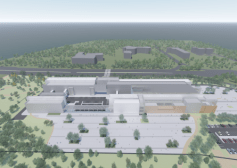Busan, South Korea – In a landmark achievement for South Korea’s eco-tourism and cultural landscape, Busan has confirmed the establishment of the National Natural Heritage Center on Eulsukdo Island, a vital ecological site at the mouth of the Nakdonggang River. With 181 billion KRW in funding secured and a construction site spanning 80,000 square meters, the center will play a crucial role in the preservation and promotion of South Korea’s natural heritage, marking another step toward Busan’s vision as a global eco-cultural city.
Eulsukdo Island, located at the confluence of the Nakdonggang River and the South Sea, has long been a focal point for South Korean biodiversity. Designated a National Monument, the island serves as a key sanctuary for migratory birds, attracting over 130,000 birds each year, including rare species such as cranes and white-fronted geese. This unique ecosystem makes Eulsukdo Island an ideal site for the National Natural Heritage Center, offering visitors and researchers alike an immersive experience in biodiversity and environmental conservation.
The selection of Busan for this prestigious project is the result of sustained efforts dating back to 2016. The city has consistently demonstrated Eulsukdo’s suitability for this role, positioning it as a prime destination for eco-tourism and cultural enrichment. With this designation, Busan aims to showcase South Korea’s natural heritage and join other globally recognized eco-cultural sites.
The National Natural Heritage Center will be Korea’s first state-run facility dedicated to the preservation, research, and display of the nation’s natural heritage. Planned facilities include research areas, exhibition halls, and secure storage facilities designed for the preservation of endangered species and rare ecological artifacts. The government’s comprehensive investment plan ensures that all operational and construction expenses will be covered by national funds, reflecting the center’s importance as a national cultural asset.
The building itself will cover 36,654 square meters over four stories, with construction expected to commence in 2026, following a final feasibility assessment. The center is scheduled to open its doors by 2030, solidifying Busan’s commitment to developing Eulsukdo Island as a cultural and educational destination.
The project aligns with South Korea’s broader push for cultural decentralization, aiming to expand high-profile cultural institutions outside Seoul and foster balanced regional development. Busan Mayor Park Heong-joon emphasized that this endeavor supports national objectives, stating, “The National Natural Heritage Center in Busan will not only elevate our city’s cultural status but also contribute to a more balanced distribution of cultural resources throughout the country.”
For Busan, the center is projected to generate significant economic and cultural benefits, attracting both local residents and international tourists. The facility will establish Eulsukdo as a key destination in Korea’s eco-tourism circuit, encouraging sustainable tourism practices and providing educational experiences for visitors.
Busan officials have set ambitious goals for the center, which is expected to become a model for eco-conscious tourism and a hub for environmental research. By offering exhibitions and hands-on learning programs, the center aims to foster a deeper appreciation for Korea’s natural history and ecology. Local and international partnerships with environmental organizations will further enhance the center’s research capacity and its potential to promote conservation.
Mayor Park envisions the National Natural Heritage Center as a space where nature and culture meet, providing visitors with access to an expansive array of educational and recreational experiences while preserving Eulsukdo’s ecological integrity. “This facility will be a landmark that harmonizes the Nakdonggang River’s ecological richness with Korea’s cultural heritage,” he noted. “It will play a central role in educating future generations and establishing Busan as a leader in eco-cultural tourism.”
With plans for a feasibility study next year, Busan is collaborating closely with the Cultural Heritage Administration to bring this ambitious project to fruition. Upon completion, the National Natural Heritage Center will stand as a testament to Busan’s dedication to preserving and celebrating Korea’s unique natural environment. For the people of Busan and eco-tourists worldwide, Eulsukdo Island will serve as both a refuge for migratory birds and a beacon of environmental stewardship.



